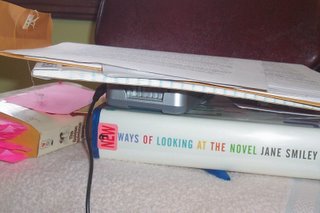work stoppage

I'm taking Christmas week off, because all the family is coming to stay on Thursday, and before that happens, I have to clean the house. I have sometimes said to people that I became a writer so I wouldn't have to clean the house--I made an early and enduring connection between writing and a kind of Bohemian lifestyle, where things like dusting and making the bed were mundane and negligible activities. I'm sure there are writers who love to clean; in fact, I know someone who can't sit down to the computer until she's put in a load of laundry or scoured the sink. I'm sure my mother wished I was this kind of writer (she had a years-long campaign to convert me to the clean-house club), but I'm not.
Having people over is a powerful motivator however, so I'm cleaning. I have a big list (as I do for anything), and I have it minutely subdivided that I can cross off items like "clear out dresser drawer" and "put away magazines on coffee table." Crossing off is essential to my particular form of listmaking/procrastination.
In the meantime, Carl and the others are languishing. I had a dream about Nancy last night. I left her visiting her stepfather's house, and she's not happy about it. Things are going badly for all of them (Carl has a friend who might have committed suicide, Nancy's holding off her mother who's trying to fix her up with someone, Jason has come across someone crazy in his ghosthunting), which is good for the novel. Bad things have to happen to good characters (and bad ones as well), or else there's no plot. But that doesn't mean they have to like it, and they don't, or the part of my subconscious that they inhabit doesn't.





